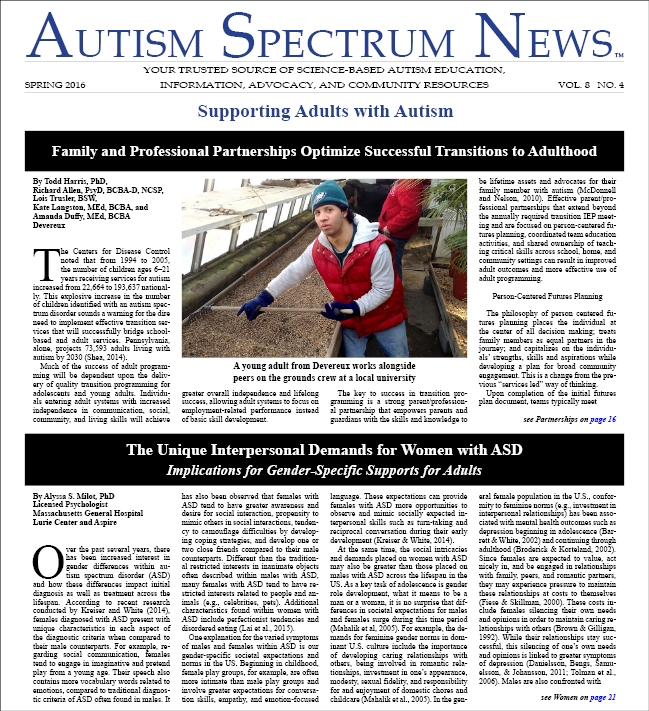“Supporting Adults with Autism”
View This Issue
Articles in This Issue
- “The Lighter Side of the Spectrum – a Mom’s View” Will He Live on His Own?
- 8 Things I Wish I Knew Before My Autism Diagnosis at 22
- Accommodating Communication Difficulties
- Adults and Autism: Insights and Changes from a Clinical Perspective
- Adults on the Autism Spectrum: An Unidentified and Forgotten Population
- Autism and Hospitals: A Difficult Match
- Building Employability Skills in Persons with ASD through Volunteerism
- College Supports for Students with ASD: Now and Looking Forward
- Community Autism Socials at Yale (Project CASY): Developing Group Intervention for Adults Living with Autism
- Defining Care for High-Functioning Adults with Autism
- Employment Boot Camp Prepares Job Seekers with ASD
- Employment Opportunities for People with disABILITIES
- Empowering Young Women with ASD to be Successful in the Workplace
- Extraordinary Ventures Creates Extraordinary Opportunities
- Family and Professional Partnerships Optimize Successful Transitions to Adulthood
- Functional Skills Training for Individuals with Autism Spectrum Disorders
- How Can College Professors Create an Inclusive Classroom? Minor Accommodations to Support Students with Autism
- Howard Savin, PhD, Joins Autism Spectrum News Editorial Board
- Kindling Studios: Igniting Passion. Actualizing Potential.
- Leaving the Family Home: Opportunities and Obstacles for Autistic Adults
- Next Stop, Adulthood: A Framework for Effective Transition Planning for Students with Severe Disabilities
- Screening for Autism in an Adult Psychiatric Facility
- Support of Coaching to Develop Key Skills that Facilitate Independent Living
- The Crisis of Incompetency
- The Dilemma of Aging Parents with Adults with Autism Still Living at Home
- The Direct Care Collaborative – Two Populations in Crisis: Adults with Severe Autism and Those That Support Them
- The Importance of Community Social Participation for Adults with ASD
- The Unique Interpersonal Demands for Women with ASD: Implications for Gender-Specific Supports for Adults






